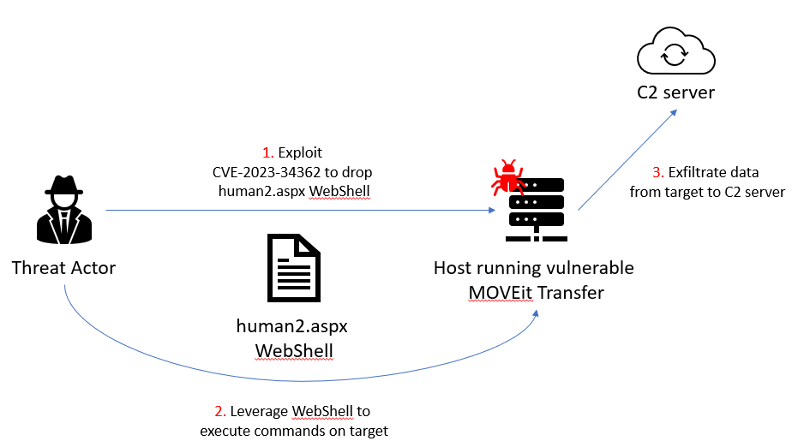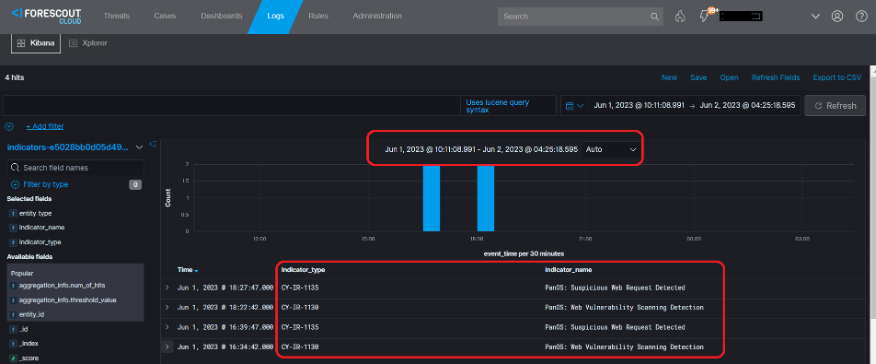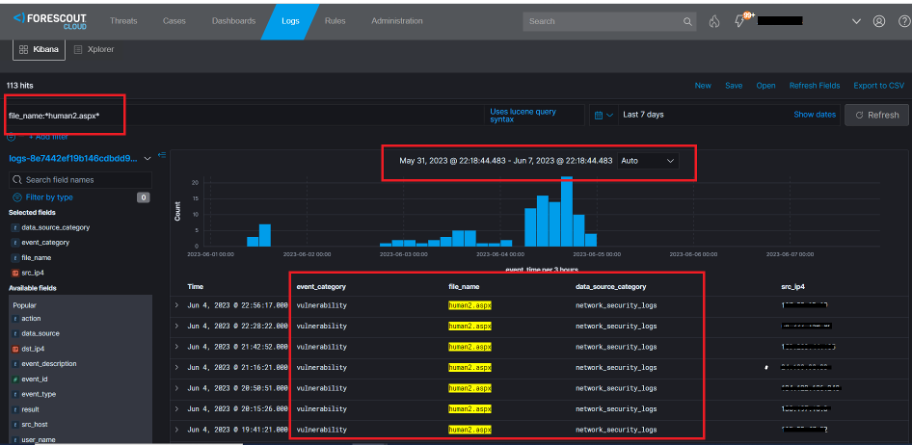Mass Exploitation of MOVEit Transfer Critical Vulnerability – Recommended Mitigations and How Forescout Can Help
On May 31, Forescout Research – Vedere Labs uncovered a significant incident where threat actors exploited a critical zero-day vulnerability in the MOVEit Transfer software, which resulted in unauthorized access to and exfiltration of private data, as well as privilege escalation.
MOVEit Transfer is a widely adopted managed file transfer (MFT) solution that enables organizations to securely exchange files with their business partners and customers. The exploited vulnerability has been assigned the identifier CVE-2023-34362.
CVE-2023-34362 is currently being mass exploited, with hundreds of organizations hit simultaneously. Although we could not attribute this particular incident to a specific threat actor with certainty, ongoing exploitation of CVE-2023-34362 has been attributed by CISA, the FBI and other organizations to the Cl0p ransomware group since May 27. The criminal group itself has claimed responsibility for the attacks with an extortion note on their website.
Cl0p is one of the most active ransomware groups and was behind last year’s attack on a UK water utility, among many other critical incidents. The group also exploited another vulnerability in a similar MFT tool in January, claiming 130 victims at that time. Researchers found evidence that the group knew about the MOVEit Transfer vulnerability for almost two years but chose to wait for the right moment to use it in a mass attack.
CVE-2023-34362 is an SQL injection affecting MOVEit Transfer versions prior to 2021.0.6 (13.0.6), 2021.1.4 (13.1.4), 2022.0.4 (14.0.4), 2022.1.5 (14.1.5) and 2023.0.1 (15.0.1). The vulnerability allows attackers to manipulate the underlying database and potentially gain unauthorized access. Exploitation of unpatched systems can occur over both HTTP and HTTPS, making all vulnerable instances susceptible to attack.
Fortunately, the software vendor, Progress, promptly addressed this vulnerability and released a patch to mitigate the risk. On June 9, the vendor also released a patch for a second SQL injection vulnerability (CVE is pending) to address concerns of exploit staging. There is no evidence that the second vulnerability has been exploited in the wild.
There are currently more than 2,500 exposed servers running MOVEit Transfer. Seventy-three percent of those are in the U.S., 5% in the UK and 4.5% in Germany, with the remaining 17.5% spread across over 80 other countries. Sixty-eight percent of the servers have a similar configuration, running over HTTPS on port 443 on top of the Microsoft IIS web server. These servers are most often observed in organizations in the healthcare, financial services and government sectors.
Read our full report for further technical details about the webshell used in the attack.
The incident exploiting CVE-2023-34362
The figure below summarizes the incident that we have detected and analyze in the full report. First, the threat actor exploited CVE-2023-34362 on an Internet-facing host running a vulnerable version of MOVEit Transfer. Second, the attacker deployed a webshell named human2.aspx that allowed them to execute commands on the target. Third, the attacker leveraged the webshell to exfiltrate data to a C2 server.

Recommended mitigations
Progress, the MOVEit Transfer vendor, has released immediate mitigation measures to assist in preventing the exploitation of CVE-2023-34362. The table below shows the security patch for each supported version of MOVEit Transfer. Customers on unsupported versions should upgrade to one of the supported fixed versions below.
| Affected Version | Fixed Version |
|---|---|
| MOVEit Transfer 2023.0.0 (15.0) | MOVEit Transfer 2023.0.1 |
| MOVEit Transfer 2022.1.x (14.1) | MOVEit Transfer 2022.1.5 |
| MOVEit Transfer 2022.0.x (14.0) | MOVEit Transfer 2022.0.4 |
| MOVEit Transfer 2021.1.x (13.1) | MOVEit Transfer 2021.1.4 |
| MOVEit Transfer 2021.0.x (13.0) | MOVEit Transfer 2021.0.6 |
| MOVEit Transfer 2020.1.x (12.1) | Special patch available |
| MOVEit Transfer 2020.0.x (12.0) or older | Must upgrade to a supported version |
| MOVEit Cloud | Prod:14.1.4.94 or 14.0.3.42
Test: 15.0.1.37 |
Additional recommended mitigation includes:
- Disable all HTTP and HTTPs traffic to your MOVEit Transfer environment. For instance, modify firewall rules to deny HTTP and HTTPS traffic towards affected products on port 80 and 443.
- Review logs for unexpected downloads of files from unknown IPs or large numbers of files downloaded. Give special attention to GET requests with the cs_uri_stem=/download parameter. These requests may indicate attempts at file exfiltration, where unauthorized individuals or threat actors are attempting to retrieve sensitive data from the system.
- Delete unauthorized files (such as aspx) and user accounts (such as “Health Check Service”) found on a system.
How Forescout can help
CISA’s first recommended action to mitigate CVE-2023-34362 is to “take an inventory of assets and data, identifying authorized and unauthorized devices and software.” The Forescout Platform can provide such an automatic inventory across all assets on the network.
Beyond building a comprehensive inventory, Forescout’s extended detection and response solution can also help to directly detect and respond to this threat. Forescout Threat Detection & Response can detect the human2.aspx webshell from both EDR and network security logs. The following rules have been added to Forescout Threat Detection & Response to provide holistic detection for this threat:
- CY-IR-1822- Emerging Threats: Potential MOVEit Transfer Web Shell Detected
- CY-IR-1135- PanOS: Suspicious Web Request Detected
- CY-IR-1130- PanOS: Web Vulnerability Scanning Detection
The figures below show a description of the “Suspicious Web Request Detected” or “Web Vulnerability Scanning Detection,” which is triggered when the webshell is detected in the monitored environment.


IOCs
The following IOCs have been observed either as part of the incident we analyzed or from external public sources.
| Type | Indicators |
|---|---|
| IP address | 92.118.36.112 92.51.2.10 3.132.217.53 186.211.1.7 5.252.189.191 5.252.190.129 5.252.190.56 5.252.190.186 5.252.190.32 5.252.190.34 45.148.120.161 45.148.120.113 4.227.193.241 27.115.124.45 197.231.197.11 185.7.33.149 185.213.175.253 180.163.220.66 102.129.143.22 |
| SHA256 | 0ea05169d111415903a1098110c34cdbbd390c23016cd4e179dd9ef507104495 2413b5d0750c23b07999ec33a5b4930be224b661aaf290a0118db803f31acbc5 348e435196dd795e1ec31169bd111c7ec964e5a6ab525a562b17f10de0ab031d 387cee566aedbafa8c114ed1c6b98d8b9b65e9f178cf2f6ae2f5ac441082747a 3a977446ed70b02864ef8cfa3135d8b134c93ef868a4cc0aa5d3c2a74545725b 3ab73ea9aebf271e5f3ed701286701d0be688bf7ad4fb276cb4fbe35c8af8409 4359aead416b1b2df8ad9e53c497806403a2253b7e13c03317fc08ad3b0b95bf 48367d94ccb4411f15d7ef9c455c92125f3ad812f2363c4d2e949ce1b615429a 5b566de1aa4b2f79f579cdac6283b33e98fdc8c1cfa6211a787f8156848d67ff 6015fed13c5510bbb89b0a5302c8b95a5b811982ff6de9930725c4630ec4011d 702421bcee1785d93271d311f0203da34cc936317e299575b06503945a6ea1e0 9d1723777de67bc7e11678db800d2a32de3bcd6c40a629cd165e3f7bbace8ead 9e89d9f045664996067a05610ea2b0ad4f7f502f73d84321fb07861348fdc24a a1269294254e958e0e58fc0fe887ebbc4201d5c266557f09c3f37542bd6d53d7 b1c299a9fe6076f370178de7b808f36135df16c4e438ef6453a39565ff2ec272 c56bcb513248885673645ff1df44d3661a75cfacdce485535da898aa9ba320d4 c77438e8657518221613fbce451c664a75f05beea2184a3ae67f30ea71d34f37 cf23ea0d63b4c4c348865cefd70c35727ea8c82ba86d56635e488d816e60ea45 d477ec94e522b8d741f46b2c00291da05c72d21c359244ccb1c211c12b635899 d49cf23d83b2743c573ba383bf6f3c28da41ac5f745cde41ef8cd1344528c195 daaa102d82550f97642887514093c98ccd51735e025995c2cc14718330a856f4 e8012a15b6f6b404a33f293205b602ece486d01337b8b3ec331cd99ccadb562e ea433739fb708f5d25c937925e499c8d2228bf245653ee89a6f3d26a5fd00b7a f0d85b65b9f6942c75271209138ab24a73da29a06bc6cc4faeddcb825058c09d fe5f8388ccea7c548d587d1e2843921c038a9f4ddad3cb03f3aa8a45c29c6a2f 4546144efb671ad4f12d81d976134903b587c31f85991626850dec3d07859d5c 53a8ef6df8ded48541178a8136d2ea6ab629a64cb44b922b2c37f3f96f77a640 93137272f3654d56b9ce63bec2e40dd816c82fb6bad9985bed477f17999a47db 01a693874c7a08826332390c7c1012cb99e5834b90917e2ee7ffb5de56a61e17 02d9a530964c8b7b8c1ff960ab078f806cb933bda0f2011abc2a25d7e89bc8a9 6cbf38f5f27e6a3eaf32e2ac73ed02898cbb5961566bb445e3c511906e2da1fa bdd4fa8e97e5e6eaaac8d6178f1cf4c324b9c59fc276fd6b368e811b327ccf8b e96a9a876ce4246781ef41a5316739a5711e393840e7f763e6e2a6c8c795ddb1 3c0dbda8a5500367c22ca224919bfc87d725d890756222c8066933286f26494c 769f77aace5eed4717c7d3142989b53bd5bac9297a6e11b2c588c3989b397e6b 7c39499dd3b0b283b242f7b7996205a9b3cf8bd5c943ef6766992204d46ec5f1 ad8d9db2e65dde04fc017961e474e58e109114f561ddf33424d602f69e6c0e2d c58c2c2ea608c83fad9326055a8271d47d8246dc9cb401e420c0971c67e19cbf b9a0baf82feb08e42fa6ca53e9ec379e79fbe8362a7dac6150eb39c2d33d94ad f40e9833ac1e31252edc39c9800742dfef5886e137bf302127b9adcb8adc2f27 367fa8b3bafd99cb0fa5efc23ffb91d0daef6e33be1378ee1eb525ff9ddd9095 |
Download the full threat briefing report for more details on the incident and the deployed payload.